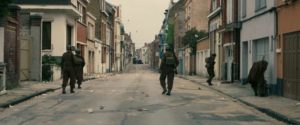With one year of the Film and TV program here at COM under my belt, I’ve been thinking recently about the lessons I learned in the past year and how I can apply them as I move forward in my career here, and thought I would share a few with you.
-
Connections connections connections
If there is anything that is stressed in anyone’s not just film and TV but COM career in general, it is making connections. Connections to your peers, connections to your professors, and connections to people in the BU and Boston communities are so important, even if you don’t know exactly why at the exact moment. It could lead to a chance to get on set for a Prod 3 film, or an internship, or just a mentor to help you through your COM journey. -
Initiative Over Skills
Film and TV is different than any other major here at BU, in that extracurricular experiences are equally important as classes to truly get the most of your experience in the program and find a job post-grad. As a result, there are a hundred different opportunities to pursue extracurriculars and get experience outside of the classroom, whether it’s through BUTV10, short film clubs, film festivals, or other personal projects. However, there is one thing that stops a lot of people from jumping into these activities: they don’t think they have the skills. And this is a completely legitimate concern, as it can be scary to go onto a set with no previous experience. But the secret to this is that although skills help a lot, all anyone is looking for here is initiative. Initiative, wanting to be there and showing up day in and day out will always get you where you want to be at COM and along the way you’ll gain skills that will open you up to even more opportunities. All you have to do is take the first step. Personally, I started BUTV10 last year working for COED as a writer with not previous writing experience, and Bay State as a Production Assistant having never been on set before. And as a result of showing initiative and wanting to be there, I was able to produce COED this semester after a year of writing for the show and will be producing Bay State next semester after a year and a half of showing up and just trying to learn a little bit each time I got on set. -
Be Honest with Yourself
Film and TV is overwhelming and broad. There are a hundred things you can do in this crazy industry we’re getting ourselves into, and sometimes it can be a challenge deciding which tracks you want to take. The key is to be honest with yourself and let yourself actually get a feel for what you think is right. Personally, I started out hearing about all the great things that are involved in production and how amazing cinematography was and so I told myself that would be the track I would take and that would be it. But a year in, I have come to realize that really, I am more of a writer and producer than a hands-on production filmmaker. And honestly, that took awhile for me to admit. It can be tough to shift and re-evaluate after you are so certain something is right for you, but in the long-run you are going to be so much better off. So if you discover that something really isn’t for you, just be honest with yourself and make the shift. It may seem stressful at the moment, but you’ll be happier in the long-run.
 Now you may think I’m thinking way too into this, but think about if Christopher Nolan had decided to do something different. What if the music had been ramped up from the beginning, creating tension from the very start. Then, change the gunshots a bit so that they are a little softer, and a little more spread out. Suddenly, they sound farther away, almost like warning shots, as opposed to an attempt on the soldiers’ lives. This gives a slightly different motivation as to why the soldiers are running, as now instead of the thought that they could die any second running through their head, they now simply believe that they should get out of the town as quickly as possible before they’re found. In addition, now the audience has less of a sense of tension and dread, and more one of thrill, feeling almost anxious about whether the soldiers will make it out of the town, on the edge of their seats.
Now you may think I’m thinking way too into this, but think about if Christopher Nolan had decided to do something different. What if the music had been ramped up from the beginning, creating tension from the very start. Then, change the gunshots a bit so that they are a little softer, and a little more spread out. Suddenly, they sound farther away, almost like warning shots, as opposed to an attempt on the soldiers’ lives. This gives a slightly different motivation as to why the soldiers are running, as now instead of the thought that they could die any second running through their head, they now simply believe that they should get out of the town as quickly as possible before they’re found. In addition, now the audience has less of a sense of tension and dread, and more one of thrill, feeling almost anxious about whether the soldiers will make it out of the town, on the edge of their seats.